David's Astronomy Pages
Images - Session 1245 (2024-09-16)
Images
(S1244)
Images
Main
Home
Page
Images
(S1246)
David's Astronomy Pages
|
Images (S1244) |
Images Main |
Home Page |
Images (S1246) |
Objects Session Notes
AT 2023sqo - CV Type Transient (non-detection) AT 2024eja - Type YSO? Transient AT 2024ugc - Transient AT 2024uue - CV Type Transient (non-detection) AT 2024vid - Type MP Transient LEDA 16241 - Galaxy with Type II Supernova 2024qiw NGC 3206 - Spiral Galaxy with Type IIn Supernova 2024bch UGC 2028 - Spiral Galaxy with Type Ia Supernova 2022xkt Variable Stars (photometric monitoring) - U And, BL Lac Nearby Stars (astrometric monitoring) - None
- Attempted All-Night Session (8.5 hr) , but after rapid development of cloud, the session had to be suspended for over 5 hours, until the cloud cleared. - 12" LX200 + ST-10XME for imaging - TS 80mm APO + ZWO ASI178MC for guiding & imaging - Ambient Temperature: 9.5°C (min) - CCD Temperature: -10°/ -15°C - Notes from 2024-09-16 >> - Aurora Images/Video from night, 2024-09-16/17 >>
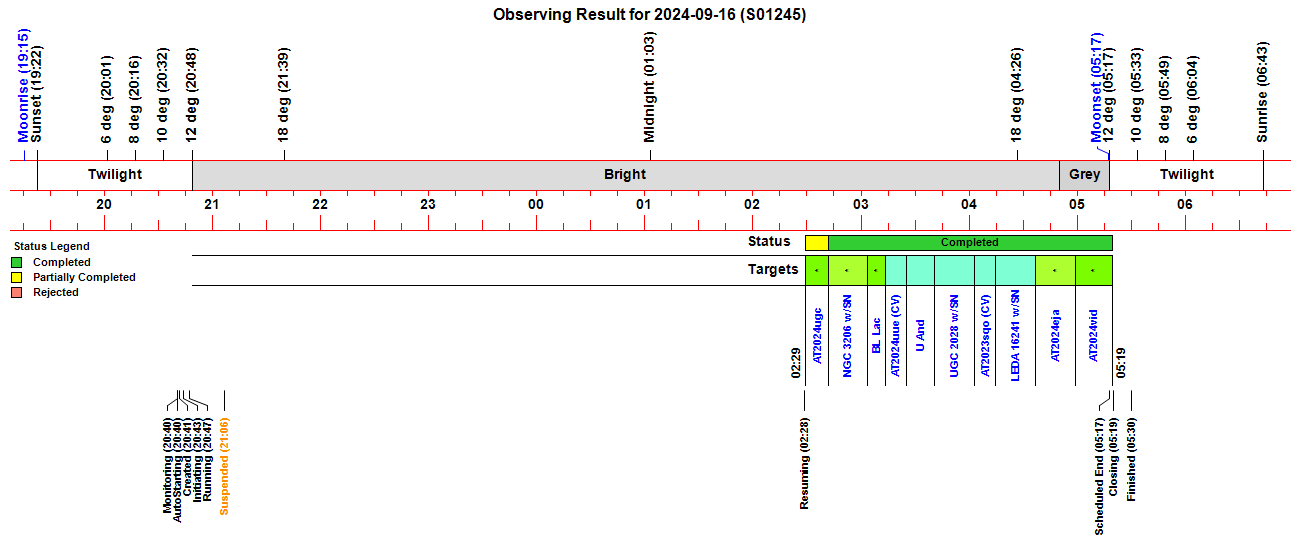 |
Back to Top
| AT 2023sqo (Cetus) AT 2023sqo (Type: CV) discovered 2023-09-12.012 UT by Gaia Alias: Gaia23cje Alerting Magnitude 14.56 (G-Gaia Filter) vs Historic Magnitude 20.30 +/- 0.20 SD 6 mag outburst in confirmed CV CSS131026:024354-160314 ( TNS 2023sqo | Gaia23cje ) |
| AT 2023sqo - 2024-09-17 (T+371.1d) Image below (2024-09-17.131) was taken 371.1 days after discovery of 2023sqo Position of earlier transient (not visible) is shown by white cross-hairs Estimated Non-Detection Limiting Magnitude +18.0 (Clear Filters) It is likely that star is lying at its normal low-stand state - around 19.9 - 20.6 |
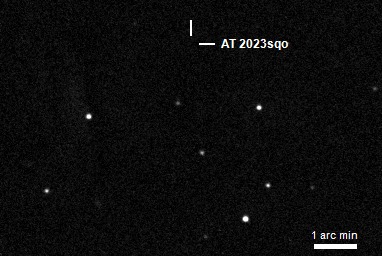 |
| Annotated CCD Image (100% size, square root scale, cropped) 4 x 60s exposure (average combine), 3x3 binning, Clear Filter 2024-09-17 03:12 UT (#1245055-59) 12" LX200R (at f/10.4) + ST-10XME Auto-guided using TS 80mm APO, ZWO ASI178MC & PHD2 |
| Images of AT 2023sqo on Transients 2023 Page >> |
Back to Top
| AT 2024eja (Monoceros) AT 2024eja (Type: YSO?) discovered 2024-03-13.147 UT by Gaia Alias: Gaia24ayy Discovery Magnitude 12.70 (G-Gaia Filter) vs Historic Magnitude 12.29 +/- 0.04 SD Dimming in candidate YSO ( TNS 2024eja | Gaia24ayy ) |
| AT 2024eja - 2024-09-17 (T+188.0d) Image below (2024-09-17.159) was taken 188.0 days after discovery of 2024eja Position of reported transient (distinct, fading ?) is shown by white cross-hairs Measured Magnitude +12.45 (Clear Filter) |
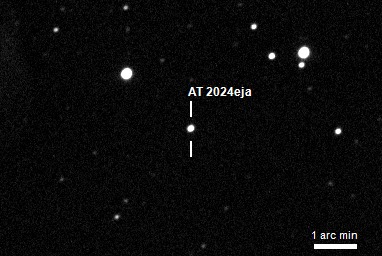 |
| Annotated CCD Image (100% size, linear scale, cropped) 2 x 180s exposure (average combine), 3x3 binning, Clear Filter 2024-09-17 03:52 UT (#1245071-72) 12" LX200R (at f/10.4) + ST-10XME Auto-guided using TS 80mm APO, ZWO ASI178MC & PHD2 |
| Images of AT 2024eja on Transients 2024 Page >> |
Back to Top
|
AT 2024ugc (Perseus) |
|
AT 2024ugc - 2024-09-17 (T+23.4d) Image below (2024-09-17.066) was taken 23.4 days after discovery of 2024ugc Position of earlier transient (faint, brightening ?) is shown by white cross-hairs Measured magnitude +16.45 (Clear Filter) |
|
|
|
Annotated CCD Image (100% size, linear scale, cropped) 180s exposure (single frame), 3x3 binning, Clear Filter 2024-09-17 01:35 UT (#1245009) 12" LX200R (at f/10.4) + ST-10XME Auto-guided using TS 80mm APO, ZWO ASI178MC & PHD2 |
| Images of AT 2024ugc on Transients 2024 Page >> |
Back to Top
| AT 2024uue (Andromeda) AT 2024uue (Type: CV) discovered 2024-09-03.746 UT by MASTER Alias: MASTER OT J230025.08+413118.7 Discovery Magnitude 16.8 (Clear Filter) ( TNS 2024uue ) |
| AT 2024uue - 2024-09-17 (T+13.4d) Image below (2024-09-17.097) was taken 13.4 days after discovery of 2024uue Position of reported transient (not visible) is shown by white cross-hairs Non-Detection Limiting Magnitude +18.0 (Clear Filters) |
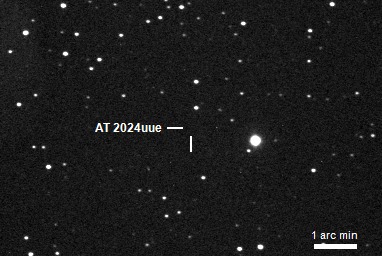 |
| Annotated CCD Image (100% size, square root scale, cropped) 4 x 60s exposure (average combine), 3x3 binning, Clear Filter 2024-09-17 02:22 UT (#1245025-29) 12" LX200R (at f/10.4) + ST-10XME Auto-guided using TS 80mm APO, ZWO ASI178MC & PHD2 |
| Images of AT2024uue on Transients 2024 Page >> |
Back to Top
|
AT 2024vid (Pegasus) |
|
AT 2024vid - 2024-09-17 (T+9.6d) Image below (2024-09-17.170) was taken 9.6 days after discovery of 2024vid Position of reported transient (ambiguous) is shown by white cross-hairs Measured magnitude (visible star) +16.36 (Clear Filter) It is unclear if the reported transient is the star lying close to cross-hairs or not |
|
|
|
Annotated CCD Image (100% size, linear scale, cropped) 5 x 60s exposure (average combine), 3x3 binning, Clear Filter 2024-09-17 04:08 UT (#1245076-80) 12" LX200R (at f/10.4) + ST-10XME Auto-guided using TS 80mm APO, ZWO ASI178MC & PHD2 |
| Images of AT 2024vid on Transients 2024 Page >> |
Back to Top
|
LEDA 16241 with SN 2024qiw (Eridanus) |
|
SN 2024qiw (T+50.7d) Bright star in fov is HIP 22701 (mag 4.36) |
|
|
|
Annotated CCD Image (50% size, linear scale) 4 x 180s exposure (average combine), 3x3 binning, Clear Filter 2024-09-17 03:27 UT (#1245062-65) 12" LX200R (at f/10.4) + ST-10XME Auto-guided using TS 80mm APO, ZWO ASI178MC & PHD2 |
|
LEDA 16241 with SN 2024qiw - 2024-09-17 (T+50.7d) Image below (2024-09-17.139) was taken 50.7 days after discovery of 2024qiw Position of reported supernova is shown by white cross-hairs Measured magnitude +15.43 (Clear Filter) |
|
|
|
Annotated CCD Image (100% size, linear scale, cropped) 4 x 180s exposure (average combine), 3x3 binning, Clear Filter 2024-09-17 03:27 UT (#1245062-65) 12" LX200R (at f/10.4) + ST-10XME Auto-guided using TS 80mm APO, ZWO ASI178MC & PHD2 |
|
|
|
Annotated CCD Image (150% size, square root scale, cropped) Image details as above |
| Images of SN 2024qiw (in LEDA 16241) on Supernova 2024 Page >> |
Back to Top
| NGC 3206 with SN 2024bch (Ursa Major) SN 2024bch (Type: IIn) discovered 2024-01-29.252 UT by Patrick Wiggins Alias: ATLAS24bmx, PS24aap, GOTO24hm Discovery Magnitude 15.5 (Clear Filter) ( TNS 2024bch ) |
| NGC 3206 with SN 2024bch - 2024-09-17 (T+231.8d) Image below (2024-09-17.074) was taken 231.8 days after discovery of 2024bch Position of reported SN (fading) is indicated by white cross-hairs. Poor quality image (poor sky quality, moonlit sky, low S/N) |
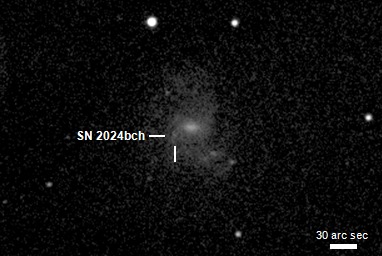 |
| Annotated CCD Image (125% size, square root scale, cropped) 5 x 180s exposure (average combine), 3x3 binning, Clear Filter 2024-09-17 01:56 UT (#1245013-17) 12" LX200R (at f/10.4) + ST-10XME Auto-guided using TS 80mm APO, ZWO ASI178MC & PHD2 |
| NGC 3206 with SN 2024bch - Earlier Image 2024-02-14 (T+15.8d) Image below (2024-02-14.083) was taken 15.8 days after discovery of 2024bch Position of reported SN (relatively bright & distinct) is indicated by white cross-hairs. Measured Magnitude +13.10 (Clear Filter) |
 |
| Annotated CCD Image (125% size, square root scale, cropped) 5 x 180s exposure (average combine), 3x3 binning, Clear Filter 2024-02-14 02:09 UT (#1185189-93) 12" LX200R (at f/10.4) + ST-10XME Auto-guided using TS 80mm APO, ZWO ASI178MC & PHD2 |
| Images of SN 2024bch (in NGC 3206) on Supernova 2024 Page >> |
Back to Top
| UGC 2028 with SN 2022xkt (Aries) SN 2022xkt (Type: Ia) discovered 2022-10-13.403 UT by ZTF Alias: ZTF22abmxsoc, ATLAS22binh Discovery Magnitude 18.6 (g-ZTF) ( TNS 2022xkt ) |
| UGC 2028 with SN 2022xkt - 2024-09-17 (T+704.7d) Image below (2024-09-17.118) was taken 704.7 days after discovery of 2022xkt Position of earlier supernova (faded & no longer visible) is shown by white cross-hairs Non-Detection Limiting Magnitude +19.0 (Clear Filter) |
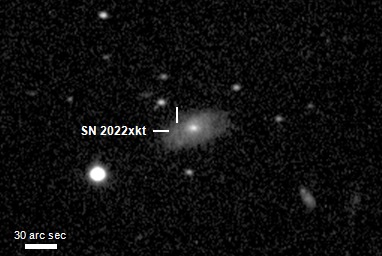 |
| Annotated CCD Image (150% size, square root scale, cropped) 4 x 180s exposure (average combine), 3x3 binning, Clear Filter 2024-09-17 02:57 UT (#1245047-50) 12" LX200R (at f/10.4) + ST-10XME Auto-guided using TS 80mm APO, ZWO ASI178MC & PHD2 |
| UGC 2028 with SN 2022xkt - Earlier Image 2022-10-29 (T+15.6d) Image below (2022-10-29.019) was taken 15.6 days after discovery of 2022xkt Position of reported supernova (faint but distinct) is shown by white cross-hairs Measured Magnitude +16.19 |
 |
| Annotated CCD Image (150% size, square root scale, cropped) 4 x 180s exposure (average combine), 3x3 binning, Clear Filter 2022-10-29 00:34 UT (#1050086-89) 12" LX200R (at f/10.4) + ST-10XME Auto-guided using TS 80mm APO, ZWO ASI178MC & PHD2 |
| Images of SN 2022xkt (UGC 2028) on Supernova 2022 Page >> |
Back to Top
| This Web Page: | Images - Session 1245 (2024-09-16) |
| Last Updated : | 2024-12-23 |
| Site Owner : | David Richards |
| Home Page : | David's Astronomy Web Site |